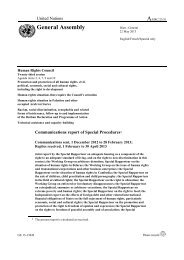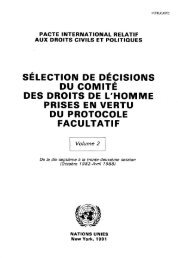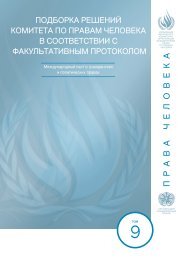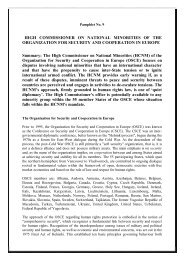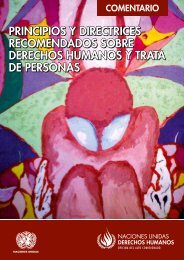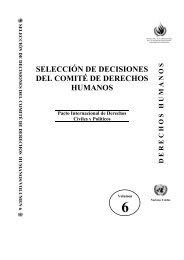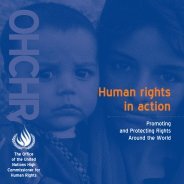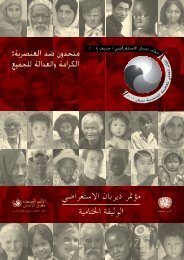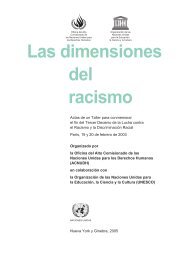good governance practices for the protection of human rights
good governance practices for the protection of human rights
good governance practices for the protection of human rights
You also want an ePaper? Increase the reach of your titles
YUMPU automatically turns print PDFs into web optimized ePapers that Google loves.
C. The role <strong>of</strong> <strong>the</strong> media in building <strong>the</strong> capacity <strong>of</strong> <strong>rights</strong>-holders<br />
to participate in local decision-making – Philippines<br />
Issue<br />
In 1991, <strong>the</strong> Philippines adopted <strong>the</strong> Local Government Code to streng<strong>the</strong>n <strong>the</strong><br />
accountability <strong>of</strong> local governments and enable civil society and local communities<br />
to actively participate in <strong>the</strong> management <strong>of</strong> local affairs. The Code was an<br />
ef<strong>for</strong>t to address a number <strong>of</strong> local <strong>governance</strong> challenges that had a negative<br />
impact on economic development and <strong>the</strong> <strong>protection</strong> <strong>of</strong> <strong>human</strong> <strong>rights</strong>. However,<br />
<strong>the</strong> Code’s implementation faced numerous obstacles, including <strong>the</strong> lack <strong>of</strong> local<br />
societal capacity to effectively participate in public affairs. These obstacles meant<br />
that <strong>the</strong> right to participate and influence public affairs did not take hold at <strong>the</strong><br />
local level. Also, due to <strong>the</strong> continuing lack <strong>of</strong> accountability and transparency,<br />
<strong>the</strong> <strong>protection</strong> <strong>of</strong> social and economic <strong>rights</strong>, including <strong>the</strong> right to an adequate<br />
standard <strong>of</strong> living, <strong>the</strong> right to <strong>the</strong> enjoyment <strong>of</strong> physical and mental health, and<br />
<strong>the</strong> right to education, was compromised.<br />
Response<br />
Civil society organizations and <strong>the</strong> media initiated a collaborative project to<br />
streng<strong>the</strong>n, first, <strong>the</strong>ir ability to work toge<strong>the</strong>r and, second, <strong>the</strong> ability <strong>of</strong> local<br />
communities to participate effectively in local government. The ef<strong>for</strong>t was designed<br />
to raise awareness within communities about <strong>the</strong>ir right to participate in<br />
local government and to empower <strong>the</strong>m to demand <strong>good</strong> <strong>governance</strong> <strong>practices</strong>.<br />
The media contributed by sparking debate on local issues as well as by facilitating<br />
advocacy networks between communities, local governments and civil<br />
society organizations, particularly on issues important to <strong>the</strong> poor, <strong>the</strong> marginalized<br />
and <strong>the</strong> disadvantaged. The motivation behind this endeavour was <strong>the</strong><br />
understanding that <strong>the</strong> media are not simply communicators <strong>of</strong> facts, but that<br />
<strong>the</strong>y also influence public policy agendas and can act as catalysts <strong>for</strong> community<br />
ef<strong>for</strong>ts to demand <strong>good</strong> <strong>governance</strong>.<br />
Design<br />
Philippine civil society organizations operating nationwide have experience and<br />
skills in working with diverse stakeholders to advocate public policies respectful<br />
<strong>of</strong> <strong>human</strong> <strong>rights</strong>. In collaboration with <strong>the</strong> United Nations Development Programme<br />
(UNDP) in <strong>the</strong> Philippines, civil society organizations and <strong>the</strong> Government<br />
established partnerships to develop similar capacity locally.<br />
In this context, <strong>the</strong> Center <strong>for</strong> Community Journalism and Development (CCJD),<br />
a national NGO which works with local media partners, would train regional<br />
and local media to work with communities on how to engage with local governments<br />
on issues such as accountability, transparency and <strong>human</strong> <strong>rights</strong>. Training<br />
and public <strong>for</strong>ums would be used to improve <strong>the</strong> skills <strong>of</strong> local media and to help<br />
<strong>the</strong>m identify public policy issues important to local communities. Subsequently,<br />
15



